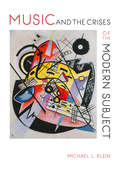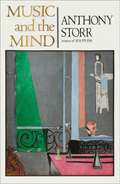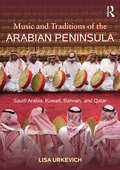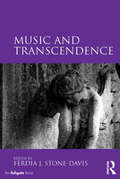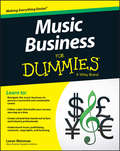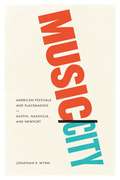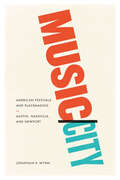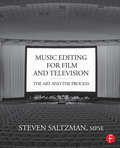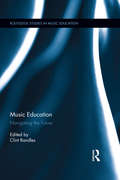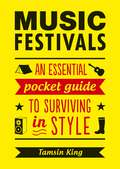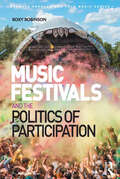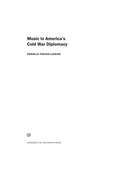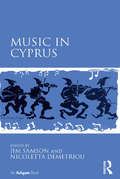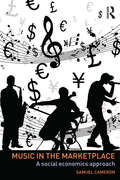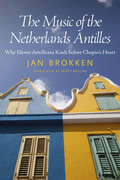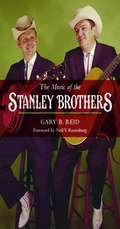- Table View
- List View
Music and the Crises of the Modern Subject
by Michael L. KleinDeparting from the traditional German school of music theorists, Michael Klein injects a unique French critical theory perspective into the framework of music and meaning. Using primarily Lacanian notions of the symptom, that unnamable jouissance located in the unconscious, and the registers of subjectivity (the Imaginary, the Symbolic Order, and the Real), Klein explores how we understand music as both an artistic form created by "the subject" and an artistic expression of a culture that imposes its history on this modern subject. By creatively navigating from critical theory to music, film, fiction, and back to music, Klein distills the kinds of meaning that we have been missing when we perform, listen to, think about, and write about music without the insights of Lacan and others into formulations of modern subjectivity.
Music and the Exotic from the Renaissance to Mozart
by Ralph P. LockeDuring the years 1500–1800, European performing arts reveled in a kaleidoscope of Otherness: Middle-Eastern harem women, fortune-telling Spanish 'Gypsies', Incan priests, Barbary pirates, moresca dancers, and more. In this prequel to his 2009 book Musical Exoticism, Ralph P. Locke explores how exotic locales and their inhabitants were characterized in musical genres ranging from instrumental pieces and popular songs to oratorios, ballets, and operas. Locke's study offers new insights into much-loved masterworks by composers such as Cavalli, Lully, Purcell, Rameau, Handel, Vivaldi, Gluck, and Mozart. In these works, evocations of ethnic and cultural Otherness often mingle attraction with envy or fear, and some pieces were understood at the time as commenting on conditions in Europe itself. Locke's accessible study, which includes numerous musical examples and rare illustrations, will be of interest to anyone who is intrigued by the relationship between music and cultural history and by the challenges of cross-cultural (mis)understanding.
Music and the Mind
by Anthony StorrWhy does music have such a powerful effect on our minds and bodies? It is the most mysterious and most intangible of all forms of art. Yet, Anthony Storr believes, music today is a deeply significant experience for a greater number of people than ever before. In this challenging book, he explores why this should be so. Music is a succession of tones through time. How can a sequence of sounds both express emotion and evoke it in the listener? Drawing on a wide variety of opinions, Storr argues that the patterns of music make sense of our inner experience, giving both structure and coherence to our feelings and emotions. Dr. Storr was a practicing psychiatrist for nearly forty years and is a distinguished thinker about the sources of creativity. He is deeply concerned with the psychology of the creative process and with the healing power of the arts. Here he explains how, in a culture which requires us in our daily working lives to separate rational thought from feelings, music reunites the mind and body, restoring our sense of personal wholeness. It is because music possesses this capacity that many people, including the author, find it so life-enhancing that it justifies existence. Dr. Storr's investigation of music is also an exploration of the human psyche. That is why this book, like all his work, deepens our understanding of ourselves and the lives we lead.
Music and Traditions of the Arabian Peninsula: Saudi Arabia, Kuwait, Bahrain, and Qatar
by Lisa UrkevichMusic and Traditions of the Arabian Peninsula provides a pioneering overview of folk and traditional urban music, along with dance and rituals, of Saudi Arabia and the Upper Gulf States of Kuwait, Bahrain, and Qatar. The nineteen chapters introduce variegated regions and subcultures and their rich and dynamic musical arts, many of which heretofore have been unknown beyond local communities. The book contains insightful descriptions of genres, instruments, poetry, and performance practices of the desert heartland (Najd), the Arabian/Persian Gulf shores, the great western cities including Makkah and Medinah, the southwestern mountains, and the hot Red Sea coast. Musical customs of distinctive groups such as Bedouin, seafarers, and regional women are explored. The book is packaged with an audio CD and almost 200 images including a full color photo essay, numerous music transcriptions, a glossary with over 400 specialized terms, and original Arabic script alongside key words to assist with further research. This book provides a much-needed introduction and organizational structure for the diverse and complex musical arts of the region.
Music and Transcendence
by Ferdia J. Stone-DavisMusic and Transcendence explores the ways in which music relates to transcendence by bringing together the disciplines of musicology, philosophy and theology, thereby uncovering congruencies between them that have often been obscured. Music has the capacity to take one outside of oneself and place one in relation to that which is ’other’. <P><P> This ’other’ can be conceived in an ’absolute’ sense, insofar as music can be thought to place the self in relation to a divine ’other’ beyond the human frame of existence. However, the ’other’ can equally well be conceived in an ’immanent’ (or secular) sense, as music is a human activity that relates to other cultural practices. Music here places the self in relation to other people and to the world more generally, shaping how the world is understood, without any reference to a God or gods. The book examines how music has not only played a significant role in many philosophical and theological accounts of the nature of existence and the self, but also provides a valuable resource for the creation of meaning on a day-to-day basis.
Music Business For Dummies
by Loren Weismanaunting than before. This guide gives you a roadmap around the landmines, and provides expert advice for starting out on the right foot.Find the right players, agents, and business managersMake more money from your work with smart distributionBuild your brand and get people talking about youGet gigs, go on tour, and keep on growingIf music is your calling, you need to plan your career in a way that sets you up for success from the very beginning. Put the right people in place, get the most out of your investments, and learn how to work the crowd both virtually and in person. Music Business For Dummies is your companion on your journey to the music career you want.
Music/City
by Jonathan R. WynnAustin's famed South by Southwest is far more than a festival celebrating indie music. It's also a big networking party that sparks the imagination of hip, creative types and galvanizes countless pilgrimages to the city. Festivals like SXSW are a lot of fun, but for city halls, media corporations, cultural institutions, and community groups, they're also a vital part of a complex growth strategy. In Music/City, Jonathan R. Wynn immerses us in the world of festivals, giving readers a unique perspective on contemporary urban and cultural life. Wynn tracks the history of festivals in Newport, Nashville, and Austin, taking readers on-site to consider different festival agendas and styles of organization. It's all here: from the musician looking to build her career to the mayor who wants to exploit a local cultural scene, from a resident's frustration over corporate branding of his city to the music executive hoping to sell records. Music/City offers a sharp perspective on cities and cultural institutions in action and analyzes how governments mobilize massive organizational resources to become promotional machines. Wynn's analysis culminates with an impassioned argument for temporary events, claiming that when done right, temporary occasions like festivals can serve as responsive, flexible, and adaptable products attuned to local places and communities.
Music/City: American Festivals and Placemaking in Austin, Nashville, and Newport
by Jonathan R. WynnAustin’s famed South by Southwest is far more than a festival celebrating indie music. It’s also a big networking party that sparks the imagination of hip, creative types and galvanizes countless pilgrimages to the city. Festivals like SXSW are a lot of fun, but for city halls, media corporations, cultural institutions, and community groups, they’re also a vital part of a complex growth strategy. In Music/City, Jonathan R. Wynn immerses us in the world of festivals, giving readers a unique perspective on contemporary urban and cultural life. Wynn tracks the history of festivals in Newport, Nashville, and Austin, taking readers on-site to consider different festival agendas and styles of organization. It’s all here: from the musician looking to build her career to the mayor who wants to exploit a local cultural scene, from a resident’s frustration over corporate branding of his city to the music executive hoping to sell records. Music/City offers a sharp perspective on cities and cultural institutions in action and analyzes how governments mobilize massive organizational resources to become promotional machines. Wynn’s analysis culminates with an impassioned argument for temporary events, claiming that when done right, temporary occasions like festivals can serve as responsive, flexible, and adaptable products attuned to local places and communities.
Music Editing for Film and Television: The Art and the Process
by Steven SaltzmanMaking music for the movies is a complicated, involved, and challenging process. Music Editing for Film and Television covers the practical skills needed to successfully hone your craft. Through an overview of the music editing process, this book will equip you with detailed techniques to solve musical problems encountered during editing. An abundance of interviews with well-known professionals provide a wide range of perspectives on music editing for film, while special features address an array of projects, from a low-budget documentary, to a Hollywood blockbuster, to indie projects.
Music Education: Navigating the Future (Routledge Studies in Music Education #1)
by Clint RandlesEducation involving music is a multifaceted and ever-altering challenge. As new media, technologies, and pedagogies are developed, academics and practitioners must make sure that they are aware of current trends and where they might lead. This book features studies on the future of music education from emerging scholars in the field. These studies are then supplemented by commentaries from established leaders of the music education community. Music Education covers topics such as music and leisure, new forms of media in music teaching and learning, the role of technology in music learning, popular music tuition in the expansion of curricular offering, and assessment of music education research. As such, it is an excellent reference for scholars and teachers as well as guide to the future of the discipline.
Music Festivals: An Essential Pocket Guide to Surviving in Style
by Tamsin KingFestivals come in every shape and size, but they are all a wonderful opportunity to have an awesome party! This guide is packed with tips to help you make the most of your festival experience, whether it’s at a sprawling tent city or a small but perfectly curated boutique festival.
Music Festivals: An Essential Pocket Guide to Surviving in Style
by Tamsin KingFestivals come in every shape and size, but they are all a wonderful opportunity to have an awesome party! This guide is packed with tips to help you make the most of your festival experience, whether it’s at a sprawling tent city or a small but perfectly curated boutique festival.
Music Festivals and the Politics of Participation (Ashgate Popular and Folk Music Series)
by Roxy RobinsonThe spread of UK music festivals has exploded since 2000. In this major contribution to cultural studies, the lid is lifted on the contemporary festival scene. Gone are the days of a handful of formulaic, large events dominating the market place. Across the country, hundreds of ’boutique’ gatherings have popped up, drawing hundreds of thousands of festival-goers into the fields. Why has this happened? What has led to this change? In her richly detailed study, industry insider Dr Roxy Robinson uncovers the dynamics that have led to the formation and evolution of the modern festival scene. Tracing the history of the culture as far back as the fifties, this book examines the tensions between authenticity and commerce as festivals grew into a widespread, professionalized industry. Setting the scene as a fragmented, yet highly competitive market, Music Festivals and the Politics of Participation examines the emergence of key trends with a focus on surrealist production and popular theatricality. For the first time, the transatlantic relationship between British promoters and the social experiment-come-festival Burning Man is documented, uncovering its role in promoting a politics of participation that has dramatically altered the festival experience. Taking an in-depth approach to examining key events, including the fastest growing independent music festival in recent years (Hampshire’s BoomTown Fair) the UK market is shown to have produced a scene that champions co-production and the democratization of festival space. This is a vital text for anyone interested in British culture.
Music in America's Cold War Diplomacy
by Danielle Fosler-LussierDuring the Cold War, thousands of musicians from the United States traveled the world, sponsored by the U.S. State Department's Cultural Presentations program. Performances of music in many styles--classical, rock 'n' roll, folk, blues, and jazz--competed with those by traveling Soviet and mainland Chinese artists, enhancing the prestige of American culture. These concerts offered audiences around the world evidence of America's improving race relations, excellent musicianship, and generosity toward other peoples. Through personal contacts and the media, musical diplomacy also created subtle musical, social, and political relationships on a global scale. Although born of state-sponsored tours often conceived as propaganda ventures, these relationships were in themselves great diplomatic achievements and constituted the essence of America's soft power. Using archival documents and newly collected oral histories, Danielle Fosler-Lussier shows that musical diplomacy had vastly different meanings for its various participants, including government officials, musicians, concert promoters, and audiences. Through the stories of musicians from Louis Armstrong and Marian Anderson to orchestras and college choirs, Fosler-Lussier deftly explores the value and consequences of "musical diplomacy."
Music in Context: Manuscripts and Medieval Song
by Deeming, Helen and Leach, Elizabeth Eva Helen Deeming Elizabeth Eva LeachThe manuscript sources of medieval song rarely fit the description of 'songbook' easily. Instead, they are very often mixed compilations that place songs alongside other diverse contents, and the songs themselves may be inscribed as texts alone or as verbal and musical notation. This book looks afresh at these manuscripts through ten case studies, representing key sources in Latin, French, German, and English from across Europe during the Middle Ages. Each chapter is authored by a leading expert and treats a case study in detail, including a listing of the manuscript's overall contents, a summary of its treatment in scholarship, and up-to-date bibliographical references. Drawing on recent scholarly methodologies, the contributors uncover what these books and the songs within them meant to their medieval audience and reveal a wealth of new information about the original contexts of songs both in performance and as committed to parchment.
Music in Context: The Operas of Maurice Ravel
by Emily KilpatrickMaurice Ravel's operas L'Heure espagnole (1907/1911) and L'Enfant et les sortilèges (1919–25) are pivotal works in the composer's relatively small œuvre. Emerging from periods shaped by very distinct musical concerns and historical circumstances, these two vastly different works nevertheless share qualities that reveal the heart of Ravel's compositional aesthetic. In this comprehensive study, Emily Kilpatrick unites musical, literary, biographical and cultural perspectives to shed new light on Ravel's operas. In documenting the operas' history, setting them within the cultural canvas of their creation and pursuing diverse strands of analytical and thematic exploration, Kilpatrick reveals crucial aspects of the composer's working life: his approach to creative collaboration, his responsiveness to cultural, aesthetic and musical debate, and the centrality of language and literature in his compositional practice. The first study of its kind, this book is an invaluable resource for students, specialists, opera-goers and devotees of French music.
Music in Cyprus
by Jim Samson Nicoletta DemetriouMusic in Cyprus draws its authors from both sides of the divided island to give a rounded picture of musical culture from the beginning of the British colonial period (1878-1960) until today. The book crosses conventional scholarly divides between musicology and ethnomusicology in order to achieve a panorama of music, culture and politics. Shared practices of traditional music and dance are outlined, and the appropriation of those practices by both communities in the aftermath of the de facto division of the island is examined. Art music (European and Ottoman) is also discussed, both in terms of the structures of musical life and the creative praxes of composers, and there is an account of the early stages of a popular music industry. The authors consider such questions as: What is the role of different musics in defining national, regional, social and cultural identities in Cyprus? How do Cypriot alterities illuminate European projects of modernity? And what has been the impact of westernization and modernization (and, conversely, of orientalization) on music in Cyprus? The book will be of interest to students and academics working not only in both historical musicology and ethnomusicology, but also in the history and anthropology of Cyprus and of the entire Greek-Anatolian region.
Music in the Marketplace: A social economics approach
by Samuel CameronMuch recent economic work on the music industry has been focused on the impact of technology on demand, with predictions being made of digital copyright infringement leading to the demise of the industry. In fact, there have always been profound cyclical swings in music media sales owing to the fact that music always has been, and continues to be, a discretionary purchase. This entertaining and accessible book offers an analysis of the production and consumption of music from a social economics approach. Locating music within the economic analysis of social behaviour, this books guides the reader through issues relating to production, supply, consumption and trends, wider considerations such as the international trade in music, and in particular through divisions of age, race and gender. Providing an engaging overview of this fascinating topic, this book will be of interest and relevance to students and scholars of cultural economics, management, musicology, cultural studies and those with an interest in the music industry more generally.
The Music of the Netherlands Antilles: Why Eleven Antilleans Knelt before Chopin's Heart (Caribbean Studies Series)
by Jan BrokkenThe Music of the Netherlands Antilles: Why Eleven Antilleans Knelt before Chopin's Heart is not your usual musical scholarship. In October 1999, eleven Antilleans attended the service held to commemorate the 150th anniversary of Frédéric Chopin's death. This service, held in the Warsaw church where the composer's heart is kept in an urn, was an opportunity for these Antilleans to express their debt of gratitude to Chopin, whose influence is central to Antillean music history. Press coverage of this event caused Dutch novelist and author Jan Brokken (b. 1949) to start writing this book, based on notes he took while living on Curaçao from 1993 to 2002. Anyone hoping to discover an overlooked chapter of Caribbean music and music history will be amply rewarded with this Dutch-Caribbean perspective on the pan-Caribbean process of creolization. On Curaçao, the history and legacy of slavery shaped culture and music, affecting all the New World. Brokken's portraits of prominent Dutch Antillean composers are interspersed with cultural and music history. He puts the Dutch Caribbean's contributions into a broader context by also examining the nineteenth-century works by pianist Louis Moreau Gottschalk from New Orleans and Manuel Saumell from Cuba. Brokken explores the African component of Dutch-Antillean music—examining the history of the rhythm and music known as tambú as well as American jazz pianist Chick Corea's fascination with the tumba rhythm from Curaçao. The book ends with a discussion of how recent Dutch-Caribbean adaptations of European dance forms have shifted from a classical approach to contemporary forms of Latin jazz.
The Music of the Stanley Brothers (Music in American Life)
by Gary B. Reid Neil V. RosenbergThe Music of the Stanley Brothers brings together forty years of passionate research by scholar and record label owner Gary Reid. A leading authority on Carter and Ralph Stanley, Reid augments his own vast knowledge of their music with interviews, documents ranging from books to folios sold by the brothers at shows, and the words of Ralph Stanley, former band members, guest musicians, session producers, songwriters, and bluegrass experts. The result is a reference that illuminates the Stanleys' art and history. It is all here: dates and locations; the roster of players on well-known and obscure sessions alike; master/matrix and catalog/release numbers, with reissue information; a full discography sorting out the Stanleys' complex recording history; the stories behind the music; and exquisitely informed biographical notes that place events in the context of the brothers' careers and lives. Monumental and indispensable, The Music of the Stanley Brothers provides fans and scholars alike with a guide for immersion in the long career and breathtaking repertoire of two legendary American musicians.
Music Since 1900: British Musical Modernism
by Philip RupprechtBritish Musical Modernism explores the works of eleven key composers to reveal the rapid shifts of expression and technique that transformed British art music in the post-war period. Responding to radical avant-garde developments in post-war Europe, the Manchester Group composers - Alexander Goehr, Peter Maxwell Davies, and Harrison Birtwistle - and their contemporaries assimilated the serial-structuralist preoccupations of mid-century internationalism to an art grounded in resurgent local traditions. In close readings of some thirty-five scores, Philip Rupprecht traces a modernism suffused with the formal elegance of the 1950s, the exuberant theatricality of the 1960s, and - in the works of David Bedford and Tim Souster - the pop, minimalist, and live-electronic directions of the early 1970s. Setting music-analytic insights against a broader social-historical backdrop, Rupprecht traces a British musical modernism that was at once a collective artistic endeavor, and a sounding myth of national identity.
Music Since 1900: Musical Witness and Holocaust Representation
by Amy Lynn WlodarskiThis is the first musicological study entirely devoted to a comprehensive analysis of musical Holocaust representations in the western art music tradition. Through a series of chronological case studies grounded in primary source analysis, Amy Lynn Wlodarski analyses the compositional processes and conceptual frameworks that provide key pieces with their unique representational structures and critical receptions. The study examines works composed in a variety of musical languages – from Arnold Schoenberg's dodecaphonic A Survivor from Warsaw to Steve Reich's minimalist Different Trains – and situates them within interdisciplinary discussions about the aesthetics and ethics of artistic witness. At the heart of this book are important questions about how music interacts with language and history; memory and trauma; politics and mourning. Wlodarski's detailed musical and cultural analyses provide new models for the assessment of the genre, illustrating the benefits and consequences of musical Holocaust representation in the second half of the twentieth century.
Music Since 1900: Luigi Nono
by Carola Nielinger-VakilThe anti-fascist cantata Il canto sospeso, the string quartet Fragmente - Stille, an Diotima and the 'Tragedy of Listening' Prometeo cemented Luigi Nono's place in music history. In this study, Carola Nielinger-Vakil examines these major works in the context of Nono's amalgamation of avant-garde composition with Communist political engagement. Part I discusses Il canto sospeso in the context of all of Nono's anti-fascist pieces, from the unfinished Fučik project (1951) to Ricorda cosa ti hanno fatto in Auschwitz (1966). Nielinger-Vakil explores Nono's position at the Darmstadt Music Courses, the evolution of his compositional technique, his penchant for music theatre and his use of spatial and electronic techniques to set the composer and his works against the diverging circumstances in Italy and Germany after 1945. Part II further examines these concerns and shows how they live on in Nono's work after 1975, culminating in a thorough analysis of Prometeo.
Music Since 1900: Transformations of Musical Modernism
by Guldbrandsen, Erling E. and Johnson, Julian Erling E. Guldbrandsen Julian JohnsonProfound transformations in the composition, performance and reception of modernist music have taken place in recent decades. This collection brings fresh perspectives to bear upon key questions surrounding the forms that musical modernism takes today, how modern music is performed and heard, and its relationship to earlier music. In sixteen chapters, leading figures in the field and emerging scholars examine modernist music from the inside, in terms of changing practices of composition, musical materials and overarching aesthetic principles, and from the outside, in terms of the changing contextual frameworks in which musical modernism has taken place and been understood. Shaped by a 'rehearing' of modernist music, the picture that emerges redraws the map of musical modernism as a whole and presents a full-scale re-evaluation of what the modernist movement has all been about.
Music Sketches
by Friedemann SallisThe term 'music sketch' relates to the vast variety of documents that are used by composers to work out a musical technique or idea and to prepare their work for performance or publication. These documents can often provide crucial insights into authorship, biography, editorial practice and musical analysis. This Introduction provides students and scholars with the knowledge and skills they need to embark on research projects involving the study of composers' working documents. Presenting examples of the compositional process over a 400-year period, it includes a selection of detailed case studies on how sketches were created and the techniques that were used, such as transcription and the sorting of loose leaves. Numerous illustrations of manuscripts and autographs, many of which have never been published before, show how these vital documents can be used to better understand the compositional processes of the seventeenth and eighteenth centuries.
